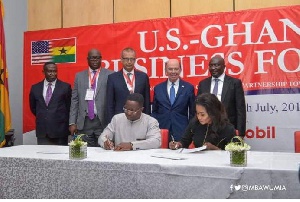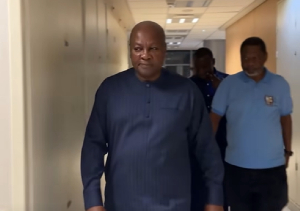Government has moved to partner with the International Business Machines Corporation (IBM) to explore how best to leverage IBM’s blockchain capabilities in modernizing key processes of land administration
This agreement is expected to serve as a major catalyst to turnaround the land administration processes in the country.
In signing of the memorandum of understanding (MoU), at the maiden U.S – Ghana Business Forum, IBM’s General Manger for Middle East and Africa, Takreem El-Tohamy said using blockchain for land administration will improve security and transparency while reducing fraud and increasing investment and access to capital.
It has been noted that land records that are stored in a centralized database have no additional benefits other than being a paper registry.
This makes it virtually impossible to collateralize property rights in Ghana since the paper registry system is unenforceable in court for which reason banks won’t accept land as collateral.
This situation has left a huge number of people without the possibility of leveraging their property to get loans and rely on the rule of law for protection, thus perpetuating a cycle of poverty for much of the population.
Using blockchain technology, it will be possible to build a land registry and a history of transactions that can be verified.
In order to implement the key policy actions recommended by the National Land Policy (NLP), the Land Administration Programme (LAP) was conceived as long term reforms (15-25 years) agenda.
The LAP is primarily focused on land administration reforms as against land tenure reforms.
To address the overarching objectives of the programme, the first phase of the project, which ended in 2011, sought to implement land policy and institutional changes and other key land administration pilot projects to lay the foundation for a sustainable and decentralised land administration system that is fair, efficient, and cost effective, while ensuring land tenure security.
The second phase, which commenced in September 2011 and ended in February, 2018, was aimed at consolidating and strengthening urban and rural land administration and management systems for efficient and transparent land service delivery.
Among other benefits, the technology will provide a globally accessible database to store land titles and transactions as well as, ensuring high capacity and throughput for millions of records.
Furthermore, the immutability of data will bring about trust and auditability to the records.
The MoU is expected, also, to enhance the modernisation of ports logistics and processes.
“For the ports, investments based on blockchain smart contracts can help advance the President’s Advisory Council on Doing Business in Africa (PAC-DBIA) objectives to improve US-Africa commercial relationship as modern customs and port logistics systems are critical for improving trade facilitation,” El-Tohamy intimated.
He noted that this demonstrates the company’s leadership in providing the latest cutting edge technologies to the Africa market in this area.
“We are doing this with a group of Ghanaian business partners, ensuring the transfer of know-how and technology,” El-Tohamy stated.
Business News of Monday, 9 July 2018
Source: goldstreetbusiness.com
Blockchain technology to revolutionise land administration processes
 Peter Amewu, Land &Natural Resources Minister (L); Angela Kyerematen-Jimoh, Country Manager sign MOU
Peter Amewu, Land &Natural Resources Minister (L); Angela Kyerematen-Jimoh, Country Manager sign MOU












